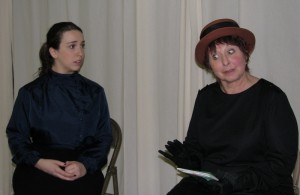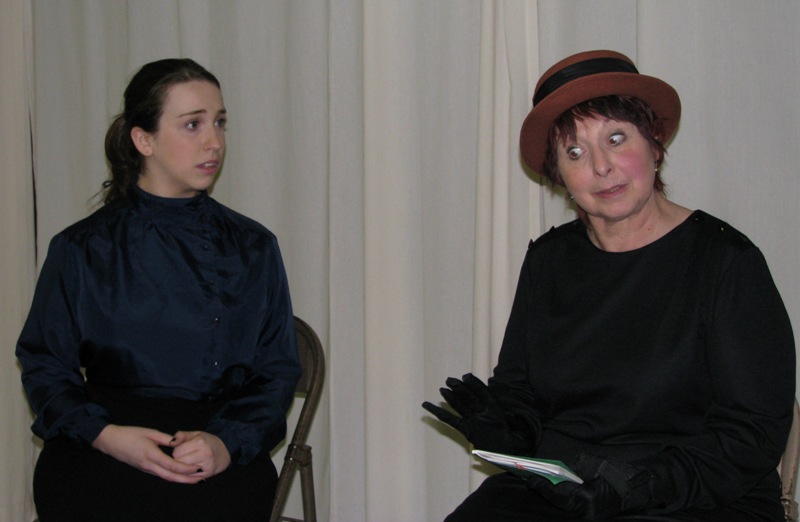
Ashley Reimer and Kathy Kanagaowski-Schreiber in a scene from Village Playbox's ENCHANTED APRIL, running in Haddon Heights, NJ through February 25.
ENCHANTED APRIL is a tale which begins in England about four years after the end of The Great War, World War I. They called it the war to end all wars back then. As a culture, we’d shocked ourselves with the astonishing volume of cruelty we were able to unleash on each other.
The world was reeling from the punch, not just physically but also psychically. Long held, rock solid cultural beliefs in the nobility and honor of war were cracking badly in the public consciousness. There were, as the play reminds us in a phrase which falls with sorrowful ease from the mouths of nearly every character, so many widows about.
This play is one of the least funny comedies you’ll ever hold dear. The world is out of joint at curtain’s rise. High jinks—or, in this case, muted, moderate jinks—and innocent scheming bring the world to its rightful place by play’s end. It is pure comic structure, which begs the question, why am I crying?
Worry not. These are tears of joy. More accurately, they are tears of relief. Even the worst hurts can heal again. That’s the message of this intriguing staging of the 2003 adaptation of Elizabeth von Armin’s 1922 novel.
The key to the jinks is Lottie Wilton, played powerfully by Ashley Reimer. This moppet of a British housewife has quirky insights and a desperate passion to escape the shallows of an empty life which moves the action of the tale throughout. Ms. Reimer gives us a Lottie with a most interesting, modern edge. Lottie is often styled as ditzy and child-like, and Ms. Reimer shows a bit of that.
But she gives us a Lottie with a bunch more grit and spine, and that’s an intriguing flavor in the mix. The original Lottie is mired in hopelessness due to her woman’s role in the culture. Impish and saucy, Ms. Reimer’s Lottie is more the way you’d expect a gifted person who’d dealt all her life with duller minds to be. I admire the choice and thank her for her performance.
Lotty is off on the adventure of her life. Accompanying her on the journey is Rose Arnott, played with spot on turns by Kathy Kanagowski-Schreib. Ms. Kanagowski-Schreib gives us stiff-upper-lip reserve melting into a human heart like the dreary English winter giving way to the glistening Italian spring. Her reserve cracks gently as she decides to take the bold step then melts precipitously into a deluge of terror as the reality of what she’s done smacks her in the face.
You do not want to miss the scene on the train where Ms. Reimer and Ms. Kanagowski-Schreib devolve from proper housewives primly perched in their seats to panicked, pleading children huddling on the floor in fear, which, interestingly, provides the biggest laugh in the play
Being practical as well as proper housewives, Lottie and Rose find two other women to join in the impetuous undertaking so that bold adventure expenses might be kept at a reasonable level. And thus it is that we meet Lady Caroline Bramble and Mrs. Graves to complete one of the most unlikely foursomes ever to find redemption in each other’s company.
Amanda Pasquini is a beautiful Lady Caroline, languorous and bored. Always the center of attention, she accompanies the group in order to be away from everyone she knows, to escape the role foist upon her by birth and class. Particularly, she wants to escape the attentions of men.
Ms. Pasquini gives us a Caroline who feels this way deeply right up to the time when she doesn’t get the attention she so loathes. When portrait artist Antony Wilder, given to us by Bill Binder with gentlemanly passion and a very clear emotional life beneath the reserve required by the play, ignores Lady Caroline opting to spend his attentions on Rose instead, Ms. Pasquini is very funny in her confused, privileged pique.
Susan Filtrante, as Mrs. Graves, takes the stage like a fiery image of the great aunt we were all afraid to kiss as children but only after the world has been dry of milk of magnesia for six weeks. And she leaves the stage as everybody’s favorite fairy godmother, hair down and dancing. She makes a wonderful transition. It warms the heart, and I thank her for her performance.
The relationship between married couples is a dominant theme in the play. Elizabeth Armin was herself married to a fellow to whom she referred as the “Man of Wrath”. ENCHANTED APRIL presents us with two surprise husbands. Why surprise? Because so many characters think they died in the war when they encounter their wives on their own. There are simply so many widows about, one naturally assumes. . .
The role of the men is to melt. It is to come around to the beauties of the world and the restoration offered by their wives offering them places we can see as heaven on earth. That is exactly what James Eckstien and Ron Brining accomplish playing Mellersh Wilton and Frederick Arnott , Lottie’s and Rose’s husbands respectively. At first distant and wrapped in their own worlds, each makes the turn with fine craft
Particularly moving are the scenes where Ms. Kanagowski-Schreib and Mr. Brining then Mr. Eckstein and Ms. Reimer face each other as married people and are finally able to express the love that’s been lying dormant for so long. These relationships, often staged and developed in tandem, form the beating heart of the play and generate many beautiful stage pictures throughout the show.
The last mention is to a very funny character, a cook who presents two appropriately butchered English words. Other than that, I did not understand a thing she said and didn’t need to. Paula Brining as Costanza is the perfect embodiment of kindly working-class incredulity at the strangeness of her employers. She could recite the phone book and we’d get it. As it is, she speaks in Italian. Thank you for that nice, tasty dash of spice to the show, Ms. Brining.
It is not a perfect production. There are a number of things wrong, but all of them can be traced back to a single one: costume changes. The costume changes kept the stage dead and made the scene changes last much too long. Time after time the show would begin picking up great pace and rhythm only to be leveled by 2.5 minutes of dead time as we all waited for costume changes. That sucked the life right out of it. I vote they wear the same darned clothes, just for heaven’s sake, let them cook.
Because heaven is what they have to offer us. When the ensemble is clicking, there is magic. When the scene changes are relatively quick, the show moves in a very satisfying way. Hope will return to the defeated, love to the isolate, joy to the mourners. We need, the play tells us, to be engaged in the beauty around us. As the audience departed, everyone I heard was talking about something moving and impressive in the show. That, I thought, was a good start.
ENCHANTED APRIL
Directed by Steve Allen
Adapted to the stage by Matthew Barber
From The Enchanted April, a novel by Elizabeth Armin
Through February 25, 2012
The Village Playbox
28 Seventh Avenue
Haddon Heights, NJ 08035
856-906-7657
http://www.villageplaybox.org/


